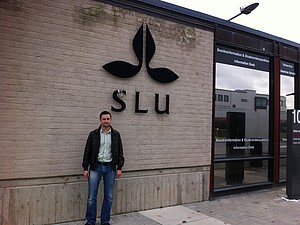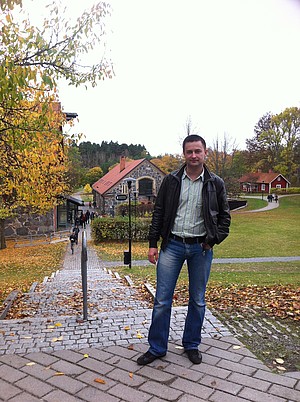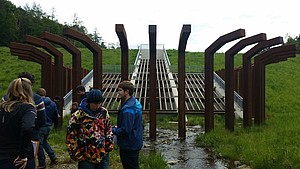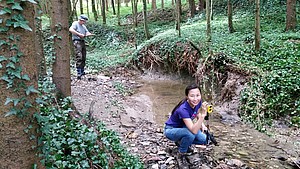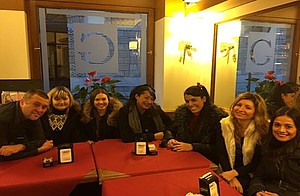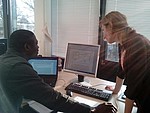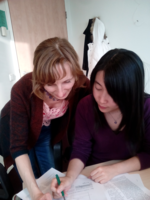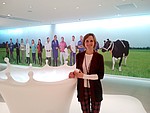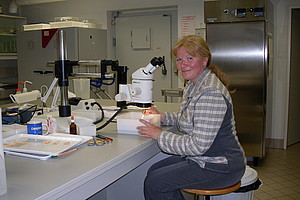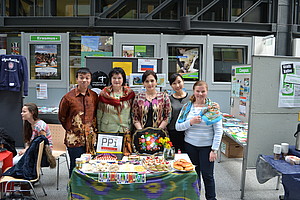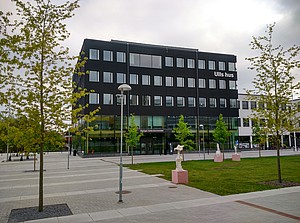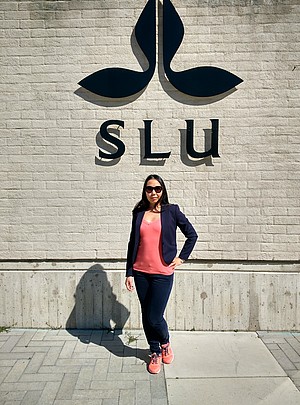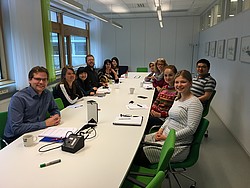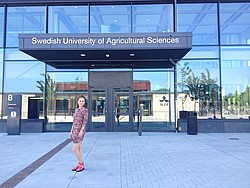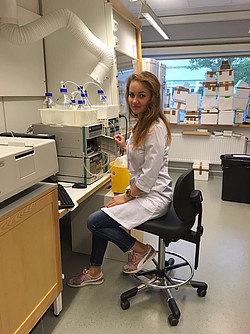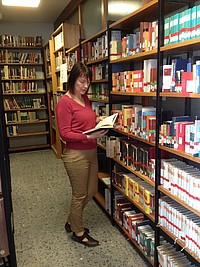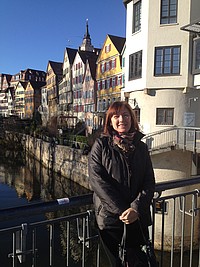Post Doctorates Stories
Post Doctorate, 6 months - WS 2014-2015 at Swedish University of Agricultural Sciences
During the period of 6 months of my stay in Uppsala, I was involved in various activities. As far as research and academic activities are concerned, I was kindly met at the Department of Economics (Agri-Food Policy and Trade Group) and introduced to the staff on my arrival. I was doing research on vertical price transmission along the diary supply chain in Russia. There was a great deal of studies to analyse vertical price transmission that applied time series econometric procedures. However, vertical price transmission in the milk market has not been investigated in Russia.
In this context, I was motivated to study vertical price transmission along the dairy supply chain in Russia to get good insight into the price interaction at the various levels of marketing chain. As a result of my research stay in Sweden I published the article in peer-reviewed Hungarian journal which is indexed in Web of Science database. The paper became my first in English in the journal indexed in Web of Science.
Every week I was discussing my research with colleagues at SLU. During one of the Department meetings, which are hold on the regular basis, I made a speech with a presentation that included facts about my research project and my native city. The research topic I was carrying out within the framework of the IAMONET-RU mobility attracted attention of PhD students and Professor Yves Surry who expressed their intention to discuss some details. Also I constantly attended research meetings and participated in discussions.
One thing I can't miss while describing my academic activity at the Host University is the opportunity to visit the University Library and get online access to the huge database of economic literature on price transmission. I found the literature sources to which I didn't have access in Russia.
This experience was very useful for my professional promotion. I made new academic contacts. I think that such professional contacts are very important because they help researches from different countries to understand each other better.
Cultural aspect of my stay in Sweden was mostly related to travelling experience. The modern infrastructure allowed me to travel during the weekends. I have been in Stockholm, Malmo, Goteborg and visited some museums there. By far, my acquired knowledge about Sweden helped to broaden my mind. During the lunches I socialized with colleagues from SLU who familiarized me with their views and ideas.
Concluding, I think that the mobility in Uppsala will radically and positively change my future academic life.
Post Doctorate, 6 months - SS 2016 at the University of Natural Resources and Life Sciences, Vienna
My reasearch is about developing a decision-support tool for conflicting interests in land-use and land-use management. The goal of the project is to analyse the willingness to pay (WTP) / willingness to accept (WTA) in flood risk management/adaptation process, in particular, focus on upstream-downstream co-operation. The idea is to analyse the perception and willingness of downstream communities to compensate upstream farmland owners for flood protection.
I had my own working place with a computer. Every two weeks my supervisor and I discussed progress in our project, methods and questionnaires. Since February I had been working on a literature review. In June I was working on methods and questionnaires for the community of Schwertberg. In July I sent my report to the supervisor. In April 2016 the "International Days" took place, during which presentations about BOKU partner universities and exchange programmes were held. The purpose of this event was to motivate current BOKU students to take part in a semester, or work placement abroad. I presented my university and country to other students who were interested in it. In May 2016 I took part in a field trip, where we studied characteristics of floods and saw several flood protection constructions. My colleagues and I were engaged in flood mapping in the district of Sankt Pölten-Land in Lower Austria (Pielachtal) after the flood which happened at the end of July 2016.
I can mention two differences in the scientific work between host and home university. First there is a higher level of presenting for researchers and lecturers in Europe and the second, the structure and content of scientific reports differ. European scientific articles are more well-structured, clear and precise. They more often follow the IMRAD methodology: introduction, literature review, methods, results, discussion and conclusion.
The IAMONET-grant and the experiences abroad will support my scientific career, because I've learnt how to write scientific articles for European academic journals. Personal Aspects: I´ve learnt self-sufficiency at work, became more communicative and open to new ideas and people. I improved my English. There were no negative aspects of my stay. I´ve got knew valuable knowledge and skills. I would definitely apply again for IAMONET and recommend to other people to take part in this program because after such experience anyone comes back a totally different, better person.
Post Doctorate, 6 months - WS 2016-2017 at the University of Udine
I would like to emphasize that my mobility helped me to advance my professional level, improve my teaching and research skills and find new opportunities for the professional and scientific development. I have obtained considerable experience in communication, establishing contacts and cooperation with colleagues from different countries with account of cross-cultural specific issues characteristic of different cultures and especially important for successful professional communication. I hope that we will continue our cooperation and will go on sharing experience in our academic and research areas.
I have got considerable experience in overcoming typical everyday difficulties and avoiding cultural gaffs and pitfalls applying my foreign language as well as strategic and problem-solving skills. I would like to apply for an Erasmus scholarship again but sometime in the future when I fully implement my current experience and will become an experienced lecturer capable of designing and delivering my own CLIL courses.
I appreciate very much soon feedback from project coordinators and good advice and assistance as to planning and scheduling of individual research programs. I think there should be some forms of published proceedings of the Projects participants (PhD researchers, Post-docs and academic staff - in co-authorship with their host-university supervisors) issued with the Project support; moreover, in case of elaboration of joint study manuals, textbooks, of laboratory manuals there should also be a possibility of their publication with the Project support. This way we could facilitate the exchange of joint research results and further disseminate the experience gained under the Project.
The most important results are:
- Elaboration of the invariant structure of a typical CLIL course of a special subject offered for multicultural groups of students within academic mobility programs;
- Acquisition of modern methods and techniques of classroom activities (brain storming, role playing, digital story telling etc.) and independent work of students and giving recommendations for choosing adequate forms of lecturer-students interaction during the course, evaluating different forms and methods of teaching;
- Analysis of the problems of language barrier and difficulties of cross-cultural adaptation;
- Better familiarization with academic mobility structure and surveying the main difficulties and optimization ways (by means of questionnaires offered to host university coordinators) giving recommendations for better training and re-training of lecturers engaged in teaching within academic mobility projects;
- participation in several international scientific conferences ("Methodical search: problems and solutions", "Modern trends of education in a multicultural society", "Dulatovskie Chteniya - 2016", "Professional linguistic education: problems and challenges");
- Publishing joint scientific papers together with host university academic staff ("Designing content and structure of content-and-language integrated learning (CLIL) courses with account of European experience" (with prof. Marina Sbrizzai), "Specific features of sociolinguistic pre-departure training of academic mobility participants" (with. Prof. Rosanna Giaquinta), "Practical implications of politically correct translation in non-linguistic universities" (with prof. Debora Saidero))
Post Doctorate, 6 months - WS 2016-2017 at Wageningen University
My IAMONET-RU mobility at Wageningen University started in September 2016 and lasted 6 months. I did my best to use this time to conduct a research. The idea of my research was to estimate Russian farmers' willingness to cooperate and settle official cooperative institutions. During my stay in Wageningen the name of the research project was determined as follows: "Determinants of Cooperation Decision for Russian Farmers".
Together with my colleagues at Wageningen University I made a literature review, chose research methodology, determined the hypothesis and model variables, created a questionnaire, conducted preliminary interviews in Russia (by Russian co-authors), collected preliminary statistical database, discussed preliminary model results, and wrote a conference paper. The paper was submitted to the EAAE Congress 2017, however, was accepted only as a poster presentation due to a small number of collected data in Russia (only 100 questionnaires).
The questionnaire collection and work on the model results continued after I returned from the Netherlands back to Russia. The paper in Russian is currently in a publication process. We plan to submit this paper to one of the international journals as soon as the paper in English will be finalized.
My supervisor at Wageningen University and one of his colleagues have become my co-authors. I am grateful to other colleagues in Wageningen as well for their help and valuable comments during my work on the statistical data and modelling approach. I hope some of them might also become my co-authors in the future.
During my stay in Wageningen I had an opportunity to visit different seminars and workshops, e.g. the workshop on cooperatives, entitled "ERNAC Seminar Multidisciplinary Perspectives in Research on Cooperatives". I also visited one of the biggest Dutch farmers cooperatives "FrieslandCampina" during my stay in Wageningen.
Social occasions with colleagues at our Department made my mobility in Wageningen joyful. My special gratitude goes to the University Church "ICF" in Wageningen for their kind help on an accommodation in Wageningen, as well as joyful meetings and student activities while my stay in the Netherlands.
Post Doctorate, 10 months - starting WS 2015-2016 at the University of Natural Resources and Life Sciences, Vienna
I have already participated in the program IAMONET-RU in 2010. My first IAMONET-RU experience was as Academic Staff for 3 months at BOKU University, Vienna, Austria.
Following the invitation of Prof. Peter Shausberger, I attended his lectures and got acquainted with the Institute of Plant Protection, his working group and the laboratory. These contacts helped me to take part in the research project now.
I am involved in the experiment "acclimatization effects on the interaction between IG prey and alien IG predator" within the framework of the project ''potential of the alien biocontral agent Amblydromalus limonicus. to become invasive under climate warming scenarios", founded by the Austrian Climate and Energy Fund. My supervisor, Dr. Andreas Walzer, was always in contact with me, helped me not only as a scientific leader, but also personally.
Many thanks to the Director of Division of Plant Protection - Siegrid Steinkellner (Univ.Prof Dipl.-Ing. Dr.nat.techn), and my colleagues: Elisabeth Helene Koschier (Ao.Univ.Prof Dipl.-Ing .Dr.nat.techn.), Dittmann Lena (Dipl.-Ing.) for their support, assistance, accommodation and warm welcome.
During the project, we participated in the 8th Symposium of the EURopean Association of ACarologists with the joint report: "Compensatory growth following transient intraguild predation risk in predatory mites".
We received a lot of primary data of our joint experiments. The data will be statistically processed in the future and presented in joint publications and reports. Of course it is a great experience for my current job and career.
Because I have already had an experience of living abroad, I did not experience any negative aspects. Of course during 10 months of residence in Vienna, I got closer to the history, culture, art and people of Austria. It broadened my horizons, I could harmoniously join the team, it became easier and easier to communicate with people. I can already hold a basic conversation in German.
I want to thank the staff of the International Department in BOKU for their operational work and also for organizing international days. It was possible to represent my country in front of Austrian students in an informal setting and become acquainted with other foreign students and participants of international programs.
I am grateful to the Erasmus project for giving me this unique opportunity and experience.
Post Doctorate, 10 months - starting WS 2015-2016 at Swedish University of Agricultural Sciences
Topic of the research conducted: My research project was devoted to investigation of properties of different products from Baikal omul. Lake Baikal is the world's oldest, deepest and largest freshwater lake. The Baikalian fauna is unique. The fatty acid composition of tissue lipids is characterized by high levels of long-chain polyunsaturated fatty acids, a feature typical of marine species.
The omul, Coregonus migratorius, also known as Baikal omul, is a whitefish species of the salmon family endemic to Lake Baikal in Siberia, Russia. It is a delicacy and it is the object of one of the largest commercial fisheries on Lake Baikal. In 2004, it was listed in Russia as an endangered species. The main goal of a project was to study biochemical characteristics of products from Baikal omul.
Integration at the faculty: I spent 10 months as a postdoc at the Department of Food Science, Swedish University of Agricultural Sciences (SLU). At the university I had my own working place, equipped with a computer. I had an ability to use all necessary equipment and materials.
My supervisor, Professor Jana Pickova, helped me to learn methods of analysis, which I needed to perform for my project. With her help I started to write the manuscript, devoted to study of fatty acid composition of products from Baikal omul.
The International Committee of the Ultuna Student Union has a Buddy program, helping international students, postdocs and staff to be easily integrated in society. I had a buddy, who helped me in many aspects of my life. In addition, the International Committee organizes special activities, such as welcoming activities and international pot luck dinner.
During my stay at SLU I had an opportunity to follow courses on Food Science from the best professors of the university. It was very helpful and extremely interesting experience for me. It helped me to fill the gaps in some topics. In addition, I attended several seminars about Food Science and related disciplines.
Differences in scientific work: There are many differences in scientific work and education system in Sweden and in Russia. I can mention the high degree of freedom that students have during the course in Sweden. In my university it's not common practice to invite representatives from the industry for giving lectures. In Sweden it's normal practice. The part of lectures is given by people, who work at the industrial enterprises.
Also I can say that lecturers in Russian Universities have to spend a lot of time giving lectures or seminars. It makes almost impossible to combine teaching and scientific activities. In Sweden it's different. Professors and other faculty members normally have time carrying out research projects.
Personal aspects: my stay in Sweden has given me the opportunity to learn new methods of analysis and to expand my knowledge and understanding of Food Chemistry and Seafood Science. I am writing a new article and I'm going to publish it soon.
The exchange time helped me to improve my English-speaking skills and to become more open-minded and flexible. I started to learn Swedish and I enjoyed this experience. I will definitely continue to learn it.
I would like to thank Erasmus Mundus Scholarship for giving me a chance to stay in Sweden and perform my research there. I would definitely apply again for this program, if it was possible.
Post Doctorate, 6 months - SS 2016 at Swedish University of Agricultural Sciences
During the period of 6 months of my stay at Swedish University of Agricultural Sciences, I was performing various activities which for example included responsibilities within 4 scientific projects: planning and experimental design, analytical work and result interpretation of the project "In vitro effect of phytochemicals on warfarin metabolism in human microsomes", planning and experimental design, analytical work and result interpretation of the project "Interaction between bioactive compounds and xenobiotica-metabolizing CYP450 in mice offspring after maternal exposure to persistent organic pollutants", analytical work in the project "Effects of human pharmaceutical found in aquatic environment on hepatic CYP1A and CYP3A-like activity in fish" as well as analytical work in the project "Combined effects of flavonoids and human pharmaceuticals on CYP450 in fish".
The results of the above mentioned activities included oral presentation at the 16-th International Nutrition & Diagnostics Conference on the topic "Inhibition of warfarin metabolism in human microsomes by bioactive compounds" as well as poster presentation at the same conference about: "Effects of quercetin and indole-3-carbinol on CYP1A in presence of a therapeutic drug, clotrimazole on fish hepatic microsomal fractions".
Furthermore two articles were published and three manuscripts submitted for publication in peer-refereed international scientific journals on the following topics: "Comparison of xenobiotic-metabolising human, porcine, rodent, and piscine cytochrome P450", "Effect of Naringenin, Quercetin, and Sesamin on Xenobiotica-Metabolizing CYP1A and CYP3A in Mice Offspring after Maternal Exposure to Persistent Organic Pollutants", "7-hydroxylation of warfarin is strongly inhibited by sesamin, but not by caffeic and ferulic acids in human hepatic microsomes", "Effect of human pharmaceuticals common to aquatic environments on hepatic CYP1A and CYP3A-like activities in rainbow trout (Oncorhynchus mykiss): an in vitro study" and "In vitro effects of diosmin, naringenin, quercetin and indole-3-carbinol on fish hepatic CYP1A1 in the presence of clotrimazole and dexamethasone".
I also was involved in teaching activities for undergraduates and gave lectures within the course "Food Chemistry" on the topics: "Colour and Flavour" and "Vitamins".
The IAMONET-RU mobility at SLU helped me improve my professional and English-speaking skills as well as my flexibility while working in an international team.
I'd like to thank my supervisor Assoc. Prof. Galia Zamaratskaia for her endless help and involvement in my research, the staff of the Food Science Department in SLU for their support and organized work.
I am grateful to the Erasmus project for giving me this unique opportunity to see another scientific world and get valuable experience for the future. Participation in the IAMONET-RU mobility in Sweden was like a surreal dream full of unforgettable moments.
Post Doctorate, 6 months - WS 2015/2016 at University of Tübingen
I was at the University of Tuebingen from November 2015 to April 2016. The topic of my research project is ""Ego - Other": the problem of identity in narrative sources of the Late Antiquity". I had an excellent opportunity to study late antiquity's sources and European bibliography, part of them is not yet available in Russia (e.g. articles devoted to personality and works of Rufus Festus).
Consultations with Prof. Dr. Mischa Meier as well as discussions with colleagues from Tubingen, other German cities and from other countries (e.g. Poland and Croatia) gave me a real possibility to compare our ideas in this field. The core of my research is an imagological approach - reception and representation of others are effected by stereotypes, as persistent, generalized notion of something, usually emotional and habitual relation to something. During my stay I focused my research on a specific genre - Breviaria, and I came to the conclusion, that they are more representative than the original conceptual texts with author's look.
The selection of material, accents and terms in abbreviated stories reflects religious, ethnical, social and other stereotypes that have been formed in the views of historians. And, what is more important - we can find out how these texts have shaped stereotypes in the minds of the general reader. I've published the article "Breviarium of Festus in the Foreign and Russian Historiography".
I participated in different activities on the faculty: lectures and discussions, meeting between professors and students of Seminar für ancient history (Alte Geschichte) every Wednesday. I was also invited to the Christmas and anniversary celebration. In addition, I got information from the Welcome centre and I took part in several workshops, which were devoted to cross-cultural communication (e.g. "Connecting Worlds - Intercultural aspects in higher education"). It helped me to communicate with people easier and to become more open-minded.
I am sure that this activity has allowed me to improve my own courses and give my students in Russia much more knowledge and skills. Personal Aspects: there is no doubt that I improved my English-speaking skills. I've visited many historical places and some museums in Germany and now I'm more interested in German culture. I started to study German and I enjoy it. I am grateful to the Erasmus project and its organizers, as well as to the University of Tuebingen for the tremendous opportunities and colossal experience. Negative aspects were absent. Definitely, I will try to apply again for IAMONET, if it is possible.

